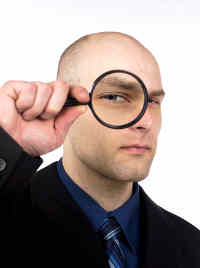“My gut tells me that the witness isn’t telling us the whole story,” one TV detective says to his partner.

I nod in empathy. I know what that feels like.
I’ve never been a member of the police force, but the way I approach life coaching is similar to the way detectives work. I’m looking to help my clients discover the truth about themselves, what they want, what’s not working for them in their current situations. To get to the good stuff, I need to be able to sense when someone has more to say, when there are deeper truths to uncover, like a detective.
Other coaches approach coaching very differently. A coach may see herself as sort of a drill sergeant whose job it is to make sure her clients get into action and get results, no matter what. Or a coach may see herself as a mentor who guides her clients to success in a particular area.
As with pretty much everything else about life coaching, there aren’t any set rules or standards about the roles that coaches play. The range of roles coaches play is quite extensive. Some coaches play many roles, and others only a few.
Being the brilliant, empowered client that you are, you can cleverly reap the benefits of this diversity and find a coach who does the stuff you want and avoid coaches who do stuff you don’t want.
The many roles coaches (almost) play
Check out this list to get a sense of the many roles coaches play (or come close to playing).
Consultant
The coach gives you recommendations and/or does work on her own time for you. For example, she’ll come up with a marketing plan for you, review your resume, or edit a chapter of your novel.
Cheerleader

Your coach is your biggest fan. She believes in you. She knows you can succeed. When you doubt yourself, when you’re scared, she’s there to remind you of how awesome you are.
Note: if you want a coach who plays this role, I suggest you find someone who actually feels this way about you. This isn’t about hiring someone to fake believing in you and supporting you.
Mentor
The coach is experienced in some area of life, and she guides you to success in that area. She’s mastered being a CEO, parenting, or writing best-sellers, and she’ll walk you through the process.
Friend
The coach is there for you. She’s on your side. She understands your perspective and cares about what you think and feel. She likes you, believes in you, and supports you. When things get rough, the coach offers you a shoulder to cry on, and she’s there to celebrate the little and big wins with you.

Therapist/psychologist
The coach helps you understand and heal or overcome problems that involve emotional and psychological challenges for you.
Coaches may not be legally not allowed to slip too far into a therapist/psychologist role, but I’ve observed many coaches over the years do things that I’d at least put in the gray zone where they’re getting awfully close to doing therapy. I’ve seen coaches give their clients psychological labels, interpret clients’ behavior from a psychological framework, and connect clients’ current feelings and actions to events of their past.
Business (or other) partner
The coach acts as a business (or other) partner for you. You can talk over plans with your coach. The coach is there to help you in a crisis. The coach is a sounding board, a brainstorming buddy, and a reality check.

But you don’t have to share the profits with her — you pay her a set fee. You don’t have to ask her opinion or get her agreement, like you would with a partner, when you make decisions about your business.
And if the relationship isn’t working for you, getting out is as simple as sending an e-mail, instead of the often time-consuming, thorny process of untangling a partnership.
Detective
The coach helps you discover what you truly want, what activities you enjoy, what makes you uncomfortable, and what your true values are.
Guru

The coach has great wisdom about life, and she takes you on a journey to understand life deeply, gain wisdom, be happy, have inner peace, become enlightened, or similar things.
Note: Though a fair number of coaches hold themselves out as gurus, in my view, this role can legitimately be played only by very few coaches, if any. (And, in case you’re curious, I’m definitely not one of them.)
Healer
The coach has a healing presence; you feel better when you talk with her. She may be skilled at one or more healing modalities, like energy work, to help you overcome mental and emotional barriers that prevent you from succeeding.
Role model
The coach is what you want to be, a successful CEO, a parent of happy kids, wealthy, a best-selling author. The coach shares practical information about how to achieve what she’s done, but you also benefit just from being around her, soaking up her comfort and ease with being what you want to be.
Drill sergeant
The coach barks out orders (to get you to achieve your goals) and you WILL do them. Now. On the double, soldier.
Accountability partner
The coach helps you to keep working steadily on your projects by giving you assignments and checking that you do them.